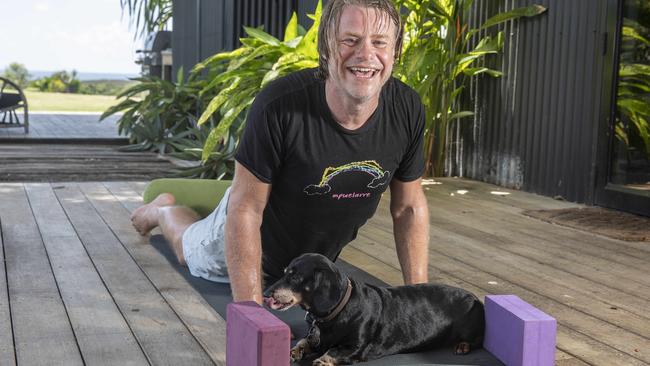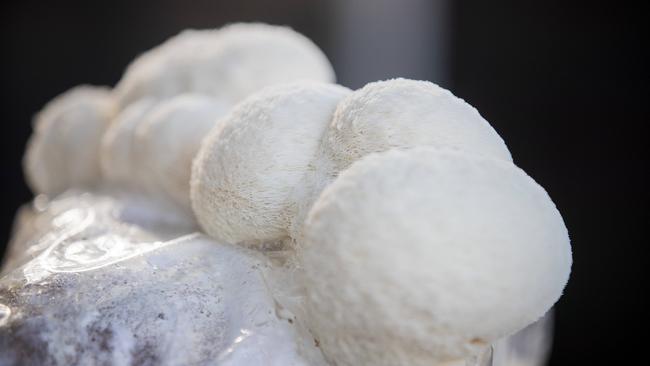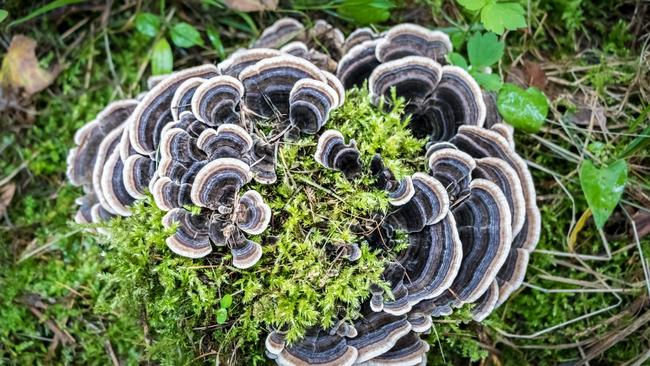Lion’s mane, turkey tail – meet the new wave of supplements, fronting a $257bn global industry
The new wave of dietary supplements sound more like a zoo than a Chemist Warehouse-sold product, as makers turn to more exotic ingredients to stand out in the $250bn wellness industry.

Radek Sali chuckles down the phone when asked who let him loose at Taronga or Werribee zoos.
It’s a fair question because a new wave of dietary supplements have emerged on shelves with names like lions mane and turkey tail.
But Sali points out that it was botanists having fun with naming mushrooms, rather than a staffer at a wellness company plucking turkey tails or armed with scissors chasing around lions to snip their manes.
“It would kind of fly in the face of plant-based medicine,” says Sali, who is two years into his new wellness venture, Wanderlust.
“It’s interesting, a lot of these fungi look like what they are called. So you Google their name and you can generally see what they’re called; a turkey tail mushroom actually looks like a turkey tail in the wild, and the same with a lions mane.”
Then there are some products which are exactly what they say on the label. For example, deer antler really comes from deer. But you won’t find that in Sali’s product range.
Despite being known in traditional Chinese and Indian medicine for centuries, health and wellness supplement companies are turning increasingly to exotic ingredients to stand out in what is becoming a crowded market.
Just walk down any aisle at a Chemist Warehouse outlet – which has annual sales of $8bn – and scores of brands compete for your attention. Online it’s more intense, where the pharmacy chain stocks more than 1000 vitamins and supplements.
There is big money to be made. According to Grand View research, the global dietary supplements market is worth $US163.9bn ($256.9bn) and is expected to have a compound growth rate of 9 per cent until at least 2030. There is still so much heat in the market that Japanese brewing giant Kirin took over Blackmores for $1.9bn – or $95 a share – representing a 30.1 per cent premium.

But do they work? Chemist Warehouse chairman Jack Gance says a lot of people still dismiss vitamins and other health supplements as “an expensive form of urine”.
“But in fact, the reality is that everything that has a vitamin label has gone through the TGA (Therapeutic Goods Administration) approval process, so you can’t say anything about the effectiveness of the products without being backed by scientific evidence,” Gance told The Australian Global Food Forum earlier this year.
While the TGA does have a rigorous approval process, the reality is more complicated, and some sellers of dietary supplements exploit a perceived loophole in therapeutic goods laws. If they don’t claim a health benefit then they can potentially fall under the novel foods category, which is regulated by Food Standards Australia New Zealand.

As food is set at a lower standard to medicine, it has opened the door to all sorts of operators to piggyback on the herbal food, or specifically mushroom, trend.
For example, one online seller selling turkey tail mushroom powder – which has been linked to various claimed health benefits, from boosting immunity to slowing cancer – included a disclaimer, in small print, saying that it was making no such therapeutic claims., It believed this was enough to escape the regulator’s scrutiny.
But a TGA spokesman said this doesn’t equate to a get-out-of-jail-free card, and in the past 12 months has requested the removal of 15,000 “unlawful advertisements” from digital platforms such as eBay and other online marketplaces, and social media channels.
“Including a disclaimer in advertising to the effect that a product does not have any therapeutic claims is not relevant in determining whether a product is a therapeutic good or a food,” the spokesman said.

“The TGA works with social media and marketplace online platforms, including eBay, to address potentially unlawful advertising of unapproved therapeutic goods.”
But even then, it’s not clear cut. For example, the TGA spokesman said: “A product that contains an ingredient, such as turkey tail, that may be associated with therapeutic effect does not automatically classify it as a therapeutic good.”
Confusing? Fertile ground for snake oil merchants? Maybe.
The TGA has attempted to provide sellers with clarity via a food medicine “interface guidance tool” to help determine whether a product is a therapeutic good or not.
For Sali – who made a fortune heading Swisse which was sold to Biostime in 2015 – rogue sellers are a nuisance.
“I pick up products with frustration all the time claiming they can do everything under the sun because they have some new mushroom ingredient that hasn’t gone through any scientific process,” he says.
Sali takes plant-based medicine seriously. So much so that he even lists nonactive ingredients – called excipients – on the labels of Wanderlust’s products, which are registered with the TGA and on the regulators website, to leave no room for doubt.

“The TGA doesn’t require us to do that but we do it proudly because there are no synthetic ingredients whereas our competitors don’t do that,” he says.
“There are a lot of products that say they are a natural health product but they are using synthesised vitamins or they are using synthetics to create binders or fillers in the product so they can make it into a tablet.
“We don’t do tablets, we do capsules and liquids and powders instead because tablets need a whole heap of binders to make them stick together.”
It has paid off at Wanderlust. The company is set to break even within three months after launching two years ago. It is a milestone that typically takes most businesses three to four years to achieve.
The market has boomed after three years of pandemic lockdowns and other restrictions cast a spotlight on health and wellness.
We are also living longer with supplements helping ease common geriatric ailments. Just ask Gance: “I have spinal stenosis and before I started taking glucosamine, I had really bad pains down my leg.”
Then there is the shift away from big pharma and more natural therapies thanks to distrust sparked during the pandemic.
Japanese brewing giant Kirin is seeking to capitalise on the hot market after it took over Blackmores for $1.9bn. “Blackmores presents an exciting opportunity to transform the scale and reach of our health science domain,” Kirin president and chief executive Yoshinori Isozaki said.
Kirin will use Blackmores – which was removed from the ASX last week – to diversify from beer and accelerate the expansion of its pharmaceutical and health sciences divisions, which currently account for about 25 per cent of its overall revenue.

Even new brands have done well. Jessica Sepel’s JSHealth Vitamins has become the No.1 hair supplement in Australian pharmacies and has expanded its retail footprint to 1500 new stores in the past 18 months.
But Sepel found she had had to be boring – at least with packaging – to stand out in a market dominated by juggernauts such as Swisse and Blackmores.
“I specifically wanted our branding to be boring and medicinal looking because vitamins are not trendy to me,” Sepel says.
“I’m not interested in trending ingredients. Collagen was something that took me years to get to because I was like ‘nup, don’t believe in collagen’ until I found a specific one from Norway, at the specific dose, with the specific science.”
Like Sali, Sepel’s products go through the TGA’s rigorous process. “We speak to our manufacturing team, they present raw materials and also need to ensure that the TGA will obviously accept,” she says.
“We also put together an evidence-based package that we present to the TGA to ensure each ingredient has enough traditional research or scientific evidence to support its function.
“It takes about a year for one product to come to life – going back and forth, back and forth looking at the research and tweaking the product.”
And this approach applies to JSHealth’s newer-wave products, such as its libido supplement, which draws Indian Ayurvedic medicine and includes tribulus, or puncture vine, traditionally considered an aphrodisiac.
“I was never going to create a libido product at all. But during Covid-19 I had thousands of messages from my customers sharing that they were struggling with low libido and then went on a mission to find ingredients proven to support that,” Sepel says.
“I’m more passionate honestly about nutrients and minerals but love using herbs when the time is right for specific pain points and conditions.”
As a result, JSHealth’s libido-boosting product was registered with the TGA in May this year.


To join the conversation, please log in. Don't have an account? Register
Join the conversation, you are commenting as Logout